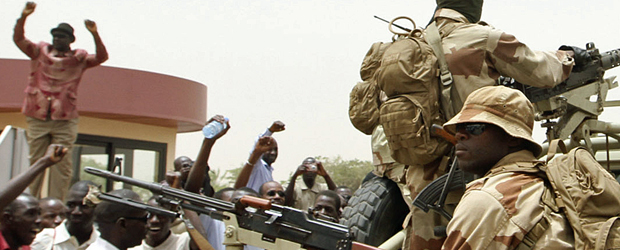Taking Timbuktu – rebels exploit Mali crisis
There are calls for a return to democratic rule in Mali after two weeks of chaos in which the government was toppled by soldiers and key northern towns – including Timbuktu – captured by separatists.

The Economic Commission of West African States (ECOWAS) announced it would impose financial and diplomatic sanctions on Mali yesterday after meeting with representatives from the United Nations, France and the United States to discuss the country’s unfolding crisis, writes Laura Mackenzie.
The ECOWAS sanctions, which experts say will cripple the land-locked West African country, follow the junta government’s failure to meet a deadline for setting a timetable for civilian rule.
The 15-nation regional bloc, which suspended Mali’s membership after the military coup, has also warned it has 2,000 troops on alert for a possible military intervention.
This comes as the UK Foreign Office issued a warning against all travel to the West African country, advising all British nationals to leave unless they have a “pressing need” to remain.
Concerns for Mali have been growing since the elected government of President Amadou Toumani Touré was unexpectedly toppled by junior members of the military on 22 March. Coup leaders – now known as the National Committee for the Recovery of Democracy (CNRDR) – say President Touré’s poor handling of the separatist Tuareg insurgency in the north was a key motive for seizing power in the capital Bamako.

But expert Alex Vines, head of the Africa programme at think tank Chatham House, says the coup has only served to bolster the northern rebels who have since made massive advances in the region.
“The military’s frustrations surrounding President Touré’s preoccupation with the south are certainly understandable but none of us expected a coup,” he told Channel 4 News. “The paradox has been that the insurgents have only been emboldened by the disarray in the south.”
Over the weekend the rebel fighters – who are feared to have links to al-Qaeda in the Islamic Mahgreb – successfully captured the Unesco world heritage site Timbuktu, along with the key strategic town of Gao.
Though Mali has a long history of insurgency, Mr Vines believes this latest upsurge – which began back in January – is in large part a blowback from events in Libya where Tuareg separatists fought for Colonel Muammar Gaddafi.
He added: “Tuareg fighters are returning to Mali with guns, emboldened by the fight in Libya. They have re-ignited the fight for national self-determination.
“It’s clear that their goal for a fully-independent state in the north of Mali isn’t viable however. What needs to happen now is for the country to return to constitutional rule immediately and the elections that were scheduled for April and May to take place.”
ECOWAS has said it will push for talks with the rebels.